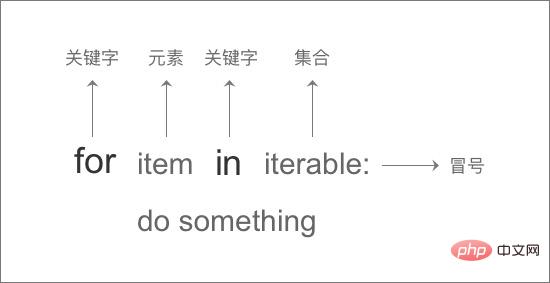How to use for to repeat (loop) in python
Python is a scripting language. He has absorbed the essence of many languages and has unique aspects. Among them, there are two types of loops in Python: for loop and while loop. In this article, I will give you a detailed introduction to using for loops to achieve certain repetitive operations.

The for loop can be used to traverse a certain object (traversal: in layman’s terms, it means to access the first element to the last element in this loop in sequence once).
The basic structure of the for loop is as follows:

Look at this case specifically:
Design one Function, create 10 texts on the desktop and name them with numbers from 1-10.
1 def text_create(): 2 path = '/Users/duwangdan/Desktop/' 3 for text_name in range(1,11): 4 # 1-10的范围需要用到range函数 5 with open (path + str(text_name) + '.txt','w') as text: 6 # with...as的用法正文内会详细介绍 7 text.write(str(text_name)) 8 text.close() 9 print('Done') 10 11 text_create()
Now let’s understand each line of code.
Line 1: Define a text_create function;
Line 2: Assign the variable path to the desktop path ;
Line 3: Load each number in the range of 1-10 into the variable text_name in turn, naming one file at a time;
Line 5: Open the txt file located on the desktop and perform writing operations for each text;
Line 7: Name each file in turn;
Line 8: Close the file;
Line 9: Display a Done after performing a naming operation;
Line 11: Call function.
The case mentioned "with...as", In Python, the "with...as" syntax is used to replace the traditional "try...finally".
For example: open the test file on the desktop, try to read the file content, and finally close the file.
1 file = open('/Users/duwangdan/Desktop/test.txt') 2 try: 3 data = file.read() 4 finally: 5 file.close()
Although this code performs well, it is relatively verbose. If it is expressed using "with...as", the code will be more concise.
1 with open('/Users/duwangdan/Desktop/test.txt') as file: 2 data = file.read()
In addition to the single-layer loop above, there is also a common loop, which is nested loop.
For example, use nested loops to implement the multiplication formula.
1 for i in range(1,10):
2 for j in range(1,10):
3 print('{} X {} = {}'.format(i,j,i*j))The outermost loop stores the numbers 1-9 in the variable i in sequence; every time the variable i takes a value, the inner loop stores the numbers 1-9 in the variable j in sequence; Finally, print out the current values of i, j, and i*j.
Starting from Python 2.6, a new format function has been added to format strings, which can be achieved through {}.format. In the above case, the values of i, j, and i*j are stored in the previous {} respectively, and then formatted to unify the form.
Related learning recommendations: python tutorial
The above is the detailed content of How to use for to repeat (loop) in python. For more information, please follow other related articles on the PHP Chinese website!

Hot AI Tools

Undresser.AI Undress
AI-powered app for creating realistic nude photos

AI Clothes Remover
Online AI tool for removing clothes from photos.

Undress AI Tool
Undress images for free

Clothoff.io
AI clothes remover

Video Face Swap
Swap faces in any video effortlessly with our completely free AI face swap tool!

Hot Article

Hot Tools

Notepad++7.3.1
Easy-to-use and free code editor

SublimeText3 Chinese version
Chinese version, very easy to use

Zend Studio 13.0.1
Powerful PHP integrated development environment

Dreamweaver CS6
Visual web development tools

SublimeText3 Mac version
God-level code editing software (SublimeText3)

Hot Topics
 1389
1389
 52
52
 Can vs code run in Windows 8
Apr 15, 2025 pm 07:24 PM
Can vs code run in Windows 8
Apr 15, 2025 pm 07:24 PM
VS Code can run on Windows 8, but the experience may not be great. First make sure the system has been updated to the latest patch, then download the VS Code installation package that matches the system architecture and install it as prompted. After installation, be aware that some extensions may be incompatible with Windows 8 and need to look for alternative extensions or use newer Windows systems in a virtual machine. Install the necessary extensions to check whether they work properly. Although VS Code is feasible on Windows 8, it is recommended to upgrade to a newer Windows system for a better development experience and security.
 Is the vscode extension malicious?
Apr 15, 2025 pm 07:57 PM
Is the vscode extension malicious?
Apr 15, 2025 pm 07:57 PM
VS Code extensions pose malicious risks, such as hiding malicious code, exploiting vulnerabilities, and masturbating as legitimate extensions. Methods to identify malicious extensions include: checking publishers, reading comments, checking code, and installing with caution. Security measures also include: security awareness, good habits, regular updates and antivirus software.
 Choosing Between PHP and Python: A Guide
Apr 18, 2025 am 12:24 AM
Choosing Between PHP and Python: A Guide
Apr 18, 2025 am 12:24 AM
PHP is suitable for web development and rapid prototyping, and Python is suitable for data science and machine learning. 1.PHP is used for dynamic web development, with simple syntax and suitable for rapid development. 2. Python has concise syntax, is suitable for multiple fields, and has a strong library ecosystem.
 How to run programs in terminal vscode
Apr 15, 2025 pm 06:42 PM
How to run programs in terminal vscode
Apr 15, 2025 pm 06:42 PM
In VS Code, you can run the program in the terminal through the following steps: Prepare the code and open the integrated terminal to ensure that the code directory is consistent with the terminal working directory. Select the run command according to the programming language (such as Python's python your_file_name.py) to check whether it runs successfully and resolve errors. Use the debugger to improve debugging efficiency.
 PHP and Python: Different Paradigms Explained
Apr 18, 2025 am 12:26 AM
PHP and Python: Different Paradigms Explained
Apr 18, 2025 am 12:26 AM
PHP is mainly procedural programming, but also supports object-oriented programming (OOP); Python supports a variety of paradigms, including OOP, functional and procedural programming. PHP is suitable for web development, and Python is suitable for a variety of applications such as data analysis and machine learning.
 Can visual studio code be used in python
Apr 15, 2025 pm 08:18 PM
Can visual studio code be used in python
Apr 15, 2025 pm 08:18 PM
VS Code can be used to write Python and provides many features that make it an ideal tool for developing Python applications. It allows users to: install Python extensions to get functions such as code completion, syntax highlighting, and debugging. Use the debugger to track code step by step, find and fix errors. Integrate Git for version control. Use code formatting tools to maintain code consistency. Use the Linting tool to spot potential problems ahead of time.
 Can vscode be used for mac
Apr 15, 2025 pm 07:36 PM
Can vscode be used for mac
Apr 15, 2025 pm 07:36 PM
VS Code is available on Mac. It has powerful extensions, Git integration, terminal and debugger, and also offers a wealth of setup options. However, for particularly large projects or highly professional development, VS Code may have performance or functional limitations.
 Can vscode run ipynb
Apr 15, 2025 pm 07:30 PM
Can vscode run ipynb
Apr 15, 2025 pm 07:30 PM
The key to running Jupyter Notebook in VS Code is to ensure that the Python environment is properly configured, understand that the code execution order is consistent with the cell order, and be aware of large files or external libraries that may affect performance. The code completion and debugging functions provided by VS Code can greatly improve coding efficiency and reduce errors.




